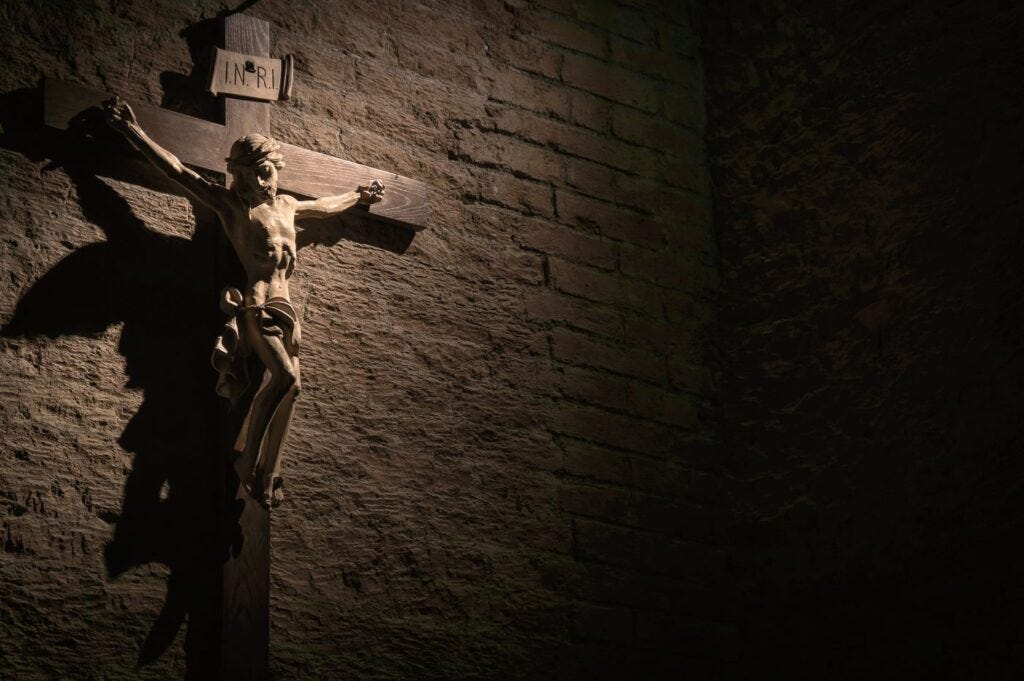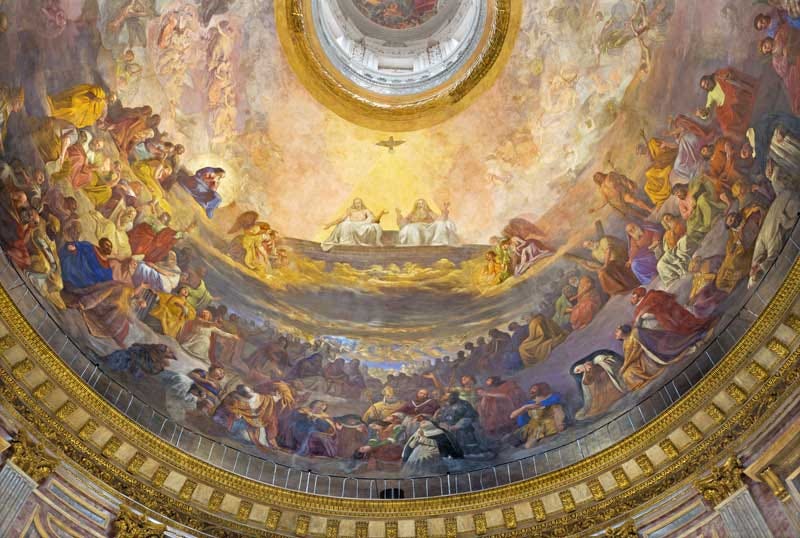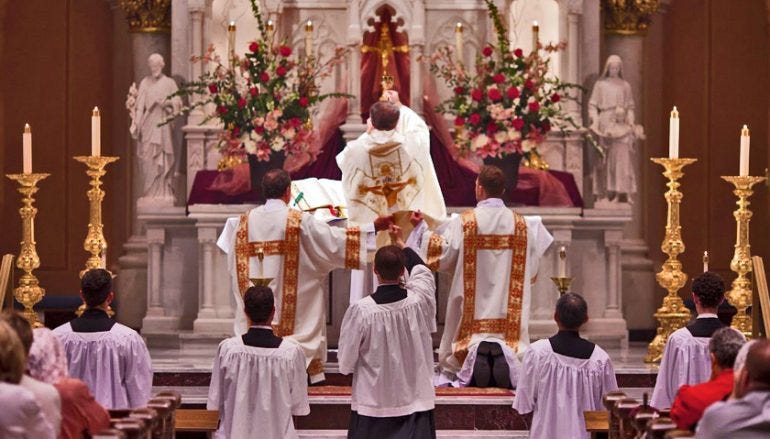Pervert Worship, Annihilate Culture
The Decline of Sacred Worship is the Root of Our Societal Collapse
The modern West finds itself in the throes of unprecedented crisis. Social trust has evaporated, family life is shattered, birthrates have plummeted, governments are suffocating under debt, and the young are aimlessly searching for purpose amidst the glow of their screens. Politicians scramble for solutions, educators devise new pedagogies, and social engineers craft endless schemes. Yet all of this is a fool’s errand. For the very heart of our civilization has been abandoned: the altar of the living God.
The biblical vision of history is covenantal. When Israel was faithful in worship, offering sacrifice to the Lord in the manner He commanded, blessings abounded: fertility, prosperity, victory, and peace. But when Israel forsook the altar and prostituted herself before foreign gods, society collapsed, enemies conquered, and families were torn asunder. This is not merely history, it is theology written into time. As the Lord warned through Hosea: “For they sow the wind, and they shall reap the whirlwind” (Hos 8:7). When worship falters, culture disintegrates.
The West is a civilization baptized in covenant. Our cathedrals once dominated skylines, the bells called men from their fields to the rhythm of prayer, and Sunday was a day set apart for God and family. It was no coincidence that from such soil sprang hospitals, universities, parliaments, and charters of rights. The Eucharist, “the source and summit of the Christian life” (Catechism 1324), stood as the fountain of cultural creativity. Remove the summit, and the mountain crumbles.
Consider the state of Europe. In France, only two percent of Catholics attend Mass weekly. In Germany, bishops quarrel over whether the Church must rewrite her sexual ethics to remain “relevant,” even as pews empty at historic rates. In Ireland, once famed for its missionary zeal, referenda in recent years have legalized abortion and same-sex marriage by popular vote. The altars have gone silent, and in their silence the covenant blessings have fled.
The American story mirrors this decline. The United States was never a Catholic nation, but it bore deeply the marks of biblical faith. As late as the 1950s, more than three-quarters of Americans were at church on Sundays. Today, the number has fallen below 30 percent. For the first time in recorded history, “nones” outnumber believers in younger generations. The fruits are bitter: suicide rates climb, mental illness spreads, fentanyl overdoses ravage cities, and despair grips a nation that once saw itself as “under God.”
To understand this collapse, we must return to the biblical principle: man was created to worship. In Eden, Adam’s priestly vocation was to “till and keep” the garden (Gen 2:15), words later used of the Levitical priests in their temple service (Num 3:7-8). The human heart is a liturgical engine; it will sacrifice to someone or something. If not the living God, then idols of power, money, sex, or ideology. In essence, man doesn’t cease to worship, he merely reorients the focus of his altars. The modern cults of identity politics, consumerism, and transhumanist fantasies are not secular, they are perverse liturgies offering burnt offerings to false gods.
The prophets thundered against such apostasies. Jeremiah condemned Israel for burning incense to Baal while claiming to be Yahweh’s people: “Has a nation changed its gods, even though they are no gods? But my people have changed their glory for that which does not profit” (Jer 2:11). What Jeremiah witnessed in his day, we witness in ours. Men who once knelt before the tabernacle now kneel before their smartphones, their portfolios, or the idols of sexual liberation. The result is the same: covenant curse.
The Church teaches that the Eucharist is not one devotion among many but the very heartbeat of Christian life. As Pope Benedict XVI wrote, “The Eucharist is the origin and goal of the Church’s mission, for in it we truly receive the Body and Blood of the Lord, who sends us forth into the world” (Sacramentum Caritatis, 84). Without the Eucharist, the Church’s mission collapses into mere activism. And without Eucharistic worship, cultures collapse into tyranny or chaos. This is the secret the West has forgotten.
We need only look to history for proof. When Rome abandoned her gods, she fell to barbarian invasion, but in that vacuum, Christian monks raised altars across Europe, and from the Mass rose a new civilization. When the Protestant Reformation shattered Eucharistic unity, Europe descended into a century of bloodshed. When the French Revolution enthroned “Reason” in Notre-Dame Cathedral, the guillotine followed swiftly. In each epoch, the lesson is the same: abandon true worship, and the consequences are catastrophic.
Today’s cultural architects imagine they can build justice, equality, or prosperity on a foundation of secular neutrality. But Christ warned of such folly: “Everyone who hears these words of mine and does not do them will be like a foolish man who built his house upon the sand. And the rain fell, and the floods came, and the winds blew and beat against that house, and it fell, and great was the fall of it” (Mt 7:26-27). A civilization without God is sandcastles against the tide.
The crisis is not merely sociological but spiritual. Pope John Paul II reminded us, “The Church draws her life from the Eucharist” (Ecclesia de Eucharistia, 1). If the Church herself wanes when she neglects the Eucharist, what hope does the world have? Catholic parents lament their children drifting into secularism, but how often have those children seen in their homes the centrality of Sunday Mass, daily prayer, and Eucharistic adoration? We cannot pass on what we do not live.
What, then, is the path forward? It begins where Israel always returned after her apostasies: the altar. Josiah, upon discovering the lost Book of the Law, tore down the idols and restored the temple sacrifices (2 Kings 23). Ezra and Nehemiah rebuilt the altar before they rebuilt the walls of Jerusalem (Ezra 3:2-3). The Maccabees purified the sanctuary after its desecration, and from that renewal came new vigor for Israel’s covenantal mission. Likewise, our renewal must be liturgical before it can be cultural.
This means Catholics must recover Eucharistic centrality. Bishops must guard the liturgy with vigilance, for as Vatican II declared, “the liturgy is the summit toward which the activity of the Church is directed” (Sacrosanctum Concilium, 10). Priests must offer Mass with reverence and fidelity, not performance and novelty. Families must reorder their lives around Sunday, refusing to let sports or commerce take precedence. Lay faithful must cultivate Eucharistic devotion, spending time in adoration and teaching their children to genuflect with love.
But beyond personal devotion, we must see the Eucharist as the true politics of the Kingdom. The altar is not only where we receive grace; it is where we learn the grammar of Christian civilization. Here the rich and poor kneel side by side, the unborn and the elderly are valued equally, and the law of love, not power, reigns. Every Mass is a protest against tyranny and a prophecy of the world to come.
The West is dying because it has forgotten how to worship. Our response must not be despair, nor must it be mere political agitation. Politics matters, yes, but politics flows from cultus. Culture is cult in action. Renew the altar, and culture will follow. Neglect the altar, and all activism is doomed.
In the end, Christ Himself gave the pattern. On the night He was betrayed, He did not rally an army or draft a manifesto. He took bread, blessed, broke, and gave it, saying, “This is my body which is given for you” (Lk 22:19). In that act, He established the covenant of His blood, a covenant that alone can heal the nations.
Therefore, in an age of collapsing institutions, of faltering families, of confused youth and tyrannical ideologies, the call is clear: return to the altar. For there, and only there, is the medicine for our civilization. There, Christ reigns. There, history finds its meaning. And there, the West will either be reborn or perish.






